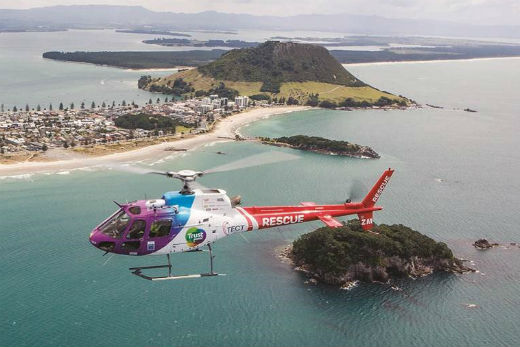A helicopter rescue over the weekend involving an injured motorcyclist was the first air transportation of a spinal injury patient under the new Ministry for Health and ACC Spinal Cord Impairment Plan.
TheTauranga-based Trustpower TECT Rescue helicopter was called to Lake Matahina in the Eastern Bay of Plenty on Sunday after a 56-year-old Waimana man collided with a tree during an organised trail ride event.
The TECT Trustpower Rescue helicopter. Photo: Supplied.
St John Medical Director Tony Smith called Base Manager Liam Brettkelly to congratulate him for completing the first mission under the new plan, which was introduced to New Zealand on August 1.
The scheme ensures any patient suffering a spinal cord injury will be transported directly to one of three specialist hospitals to maximise their long-term health and rehabilitation outcomes.
The two adult spinal specialist centres are Middlemore in Auckland – where Sunday's patient was flown to – and Christchurch Hospital.
For children, the centre is located within Auckland's Starship Hospital. If other life-threatening injuries are involved, they may be taken to the closest facility to receive life-saving care before being transported to one of the specialist centres.
The Plan's main purpose is to ensure patients receive expert treatment as soon as possible, which can minimise potential complications and rehabilitation to start sooner.
In Sunday's case, the helicopter was the preferred method of transport due to the severity of his injuries and the remote location.
'Our priority was to get him to the specialist centre for the treatment he required as quickly as possible,” says Liam.
Philips Search and Rescue Trust's rescue helicopter performed The Spinal Cord Impairment Plan which includes the introduction of the St John Spinal Cord Destination Policy, giving direction to road and air medical transportation agencies throughout New Zealand.
Last year, around 100 people received spinal cord injuries in New Zealand, and ACC currently supports around 2,000 people with spinal injuries overall. Motor vehicle crashes are the number one cause, says ACC Minister Nikki Kaye.
The Plan is welcomed by Philips Search and Rescue Trust – operators of five rescue helicopter bases throughout the central North Island – whose crews respond to many accidents involving potential spinal injuries.
In 2014 alone, the five bases carried out over 1,200 potential life-saving missions. The five bases are supported by their local communities, with over fifty percent of the operational costs coming from donations and supporters.



0 comments
Leave a Comment
You must be logged in to make a comment.